#Gorbeau Raid
Text

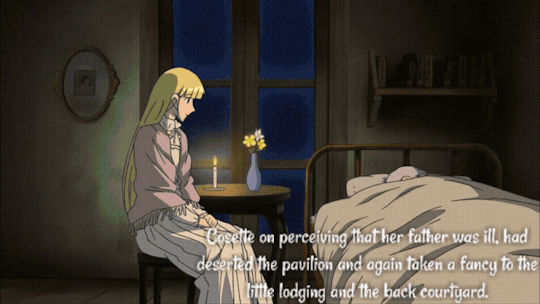
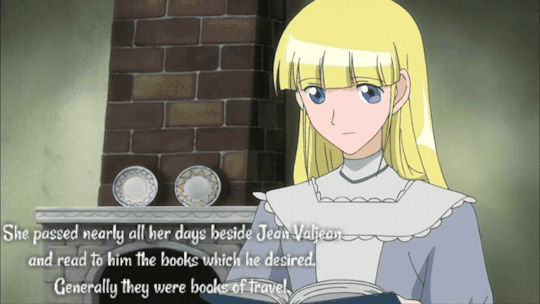


Cosette bonding with her father after the wound. Volume 4, Book 4, Chapter 1.
Clips from <Il cuore di Cosette>.
#Les miserables#les mis#My Post#Cosette#The Lark#Mlle. Ursule#Jean Valjean#Father and daughter#Owl and Wren#Rue Plumet#Gorbeau Raid#The Brick#Il cuore di Cosette#Les Mis Letters
28 notes
·
View notes
Text
What sane person would send Javert as a spy? A man who is pathologically unable to lie and who carries all his papers on himself! (I am looking at you, the Prefect of Police, M. Gisquet – you are good for nothing!) This is an amazing contrast with Jean Valjean, who is so skilled at disguising himself and lying with a poker face. Javert did not even make an effort to pretend! And then he “smiled with a smile than which nothing more disdainful, more energetic, and more resolute could be seen in the world.” He was obviously prepared for such a turn of events and was willing to die immediately: “then finish the business with a blow from a knife.” Those who claim that Javert never had suicidal tendencies before derailing are definitely missing something. This episode and the one during the Gorbeau house raid, when he recklessly risked his life, tell us a different story. (To me, he is still endlessly mesmerising. I just can’t take my eyes off him.)
And this: “Spy,” said the handsome Enjolras, “we are judges and not assassins.” Just in case anyone forgot! But jokes aside, he is thinking strategically, anticipating a lack of cartridges and powder. 50 men against 60,000 — that’s really scary. And since there is nothing worse than waiting, Enjolras decides to send his own spy, Gavroche.
Once again, it’s a golden hour for Gavroche as he recognized Javert. And it was also quite amusing because he talks like an old man: “Ah bah! impossible! My sight is bad! I am dreaming! can this be? no, it is not! but yes! why, no!” And then, before leaving the barricade, Gavroche claims Javert’s gun in the most hilarious way possible: “I leave you the musician, but I want the clarinet.”
In Hapgood’s translation, 2 minutes (before the fall of the barricade) turned into 10 minutes. She is more generous than Hugo.
58 notes
·
View notes
Text
The Thénardiers are awful and it’s horrible that they cared so little about their sons, but M Thénardier using Rousseau’s treatment of his children as a justification may be the most darkly funny thing he’s said.
The entire situation does have a dark comedic element, probably because the one being lied to is Gillenormand and because the youngest sons are treated well. Aside from the heartbreaking fact that the Thénardier children were too consumed by poverty to notice their siblings, the arrangement isn’t as bad as it could be?
It’s tragic in that they mean more as a basis of material earnings than as people, though, even to the kinder Magnon. Their parents are the first to not care, but institutions are equally cold. Thénardier is, unfortunately, right that no one’s going to look into the situation when the children are poor. That the deaths of Magnon’s actual children were only noted by her (and indirectly by her associates) is a terrible sign of how little society valued the children of the poor and of how dangerous early childhood was (an epidemic taking both of them in a day).
Worse still, they have become more of Javert’s victims, the arrests following the Gorbeau raid taking away their mother figure. It’s so sad to watch the eldest lose the note because his fingers are too cold to hold it.
21 notes
·
View notes
Text
huge thanks to @persefoneshalott for introducing me to the 1943 Mexican Les Mis movie
It takes an unusual approach, starting with Cosette leaving the convent with Valjean, and them setting up their life together. It actually spends time on this! and their Cosette and Valjean are a super cute family; Valjean delights in giving her presents and being her guide in the world, and she’s so happy to be having adventures with her dad, and there’s a fantastic bit where Valjean shares a Secret Dream with her: that he’s always wanted to buy an old book and read in the garden, and aaaaah it’s so perfect for him and so sweet?? It really makes you feel for them as a family
also Cosette’s clothes are like. Shockingly good for a movie in 1943 about 183X?
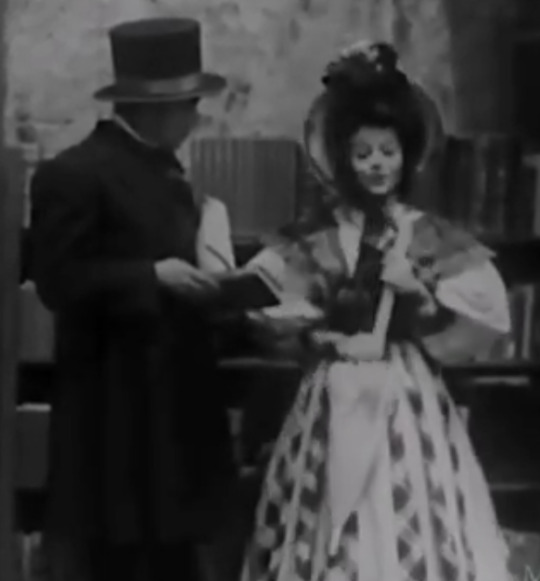
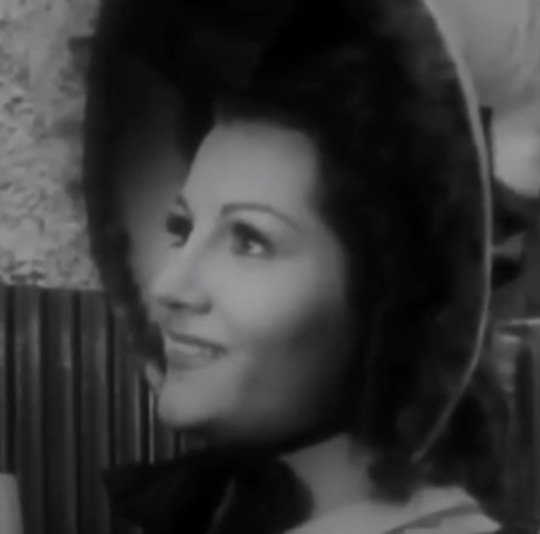

I mean it’s not about to challenge Gentleman Jack for accuracy or anything but this is pretty good! She’s got bonnets and pelerines! And So Much Sleeves!
The guys don’t fare badly either! Marius and Joly are a little too slicked-down maybe (Marius is in the hat, here):

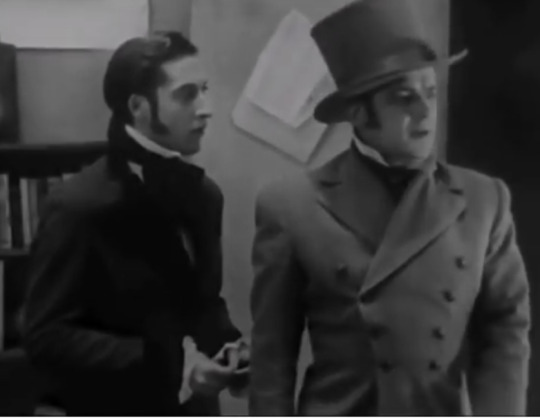
but look at those high collars! Joly’s sideburns! the very stylish over-long sleeve cuffs peeking out from under Joly’s coat sleeves! Even Marius being in a kinda unhip coat works for him.
(Also Joly owns a revolutionary bookstore in this one?? amazing choice)
And look how they use Fashion as social signifier in this scene with Javert, of all people!

That’s Javert; his superior’s valet; and his superior, who is in the process of being dressed in front of him. It establishes Javert’s status so well- you don’t get dressed in front of a social equal, there’s all kinds of rules about what a Respectable Society Man can wear in Real Company , but in front of the servants, well...
(this movie does a great job overall of establishing that Javert is not only not highly ranked, he’s Barely Tolerated and has about the social clout of a guard dog, it’s incredible for that)
ALSO this movie does something I’ve wanted to see an adaptation do for ages, and uses its post-convent starting point to really build up mystery around Valjean! the Mother Superior of the convent notes that he has more money than he should, and also doesn’t remember exactly when he reached the convent. Javert is sure he’s a hardened criminal. The Thenardiers consider him a kidnapper and think he used a position as a city official to steal a fortune. We get the whole Gorbeau raid, with suppositions and theories about him flying thick and fast, and Valjean answers none of it, and the narrative answers none of it, and Valjean gets to be presented as being Mysterious and Shady as hell, and it’s just fantastic?? I love this, let Valjean be a man of Ominous Gothic Mystery!
Also the revolution plot is introduced in the first 15 minutes? Via Marius and Joly of all people? love that for them
anyway I’m only about halfway through but so far this is unironically becoming one of my favorite versions??
94 notes
·
View notes
Text
an especially relatable aspect of jvj's character is the way he turns into a mute video game protagonist whenever he finds himself in a situation he doesn't want to be in. he barely talks through the entire gorbeau raid because he's too busy pressing x to skip thénardier’s dialogue and building up the speed to clip through the window before the unskippable javert arrest cutscene starts
#I wrote this at 5am absolutely loopy with pain and it shows#les mis#les miserables#jean valjean#javert#thenardier#e.txt
1K notes
·
View notes
Text
Brickclub 4.6.1 ‘A Malevolent Trick of the Wind’
Everything is connected, and in the world that exists just underground from respectable society, it’s even more so.
The Gorbeau raid might be the closest thing we get in this book to the police acting “justly.” The crime was real and serious, the perpetrators had committed many such crimes before, and the “correct” people were put in jail.
And even then, no good came of it. Men who were experienced criminals continued on as they were, while women and children suffered. Madame Thenardier will die, Eponine looks newly ghastly and haunted, who knows how Azelma is doing but I’m going to guess “not well”, and Mamzelle Miss and Magnon, who weren’t even there, are in jail and their young children are lost on the streets.
No matter what kind of harm is done, this book says, the people who are made to suffer most from it will be the people who always suffer most.
I don’t know what to do with this thought, but Hugo keeps repeatedly connecting Thenardier to the buying and selling of children. Thenardier is renting a child in the first half of this book, he’s renting out children now--Hugo is leaving a particular kind of evil at his door specifically. And also, Hugo is pulling his punches with what that entails--whatever small children might have been bought and sold for in 1820s Paris, a victimless grift where they’re treated well and (if all had gone well) receive an education in the bargain is a spectacularly least-worst option.
Of course, the novel ends with Thenardier massively upgrading the scope of who he gets to buy and sell.
As many others have pointed out, Magnon is another Theodule, mysteriously hated by the narrator who doesn’t really give us much reason to agree. Maybe she’s not a selfless altruist, but she treated the kids well, and she cared enough to use the time when she was being arrested to make sure they got somewhere safe. That’s a big deal in this book!
I’m also fascinated by the ten pounds a month she payed Thenardier for the privilege of keeping them. Thenardier was at one time receiving money for holding onto a child, and now he’s receiving money for giving children up. He’s very good at finding ways to twist petty profits out of things--and, as we get further confirmation of this chapter, he’s very bad at actually turning any kind of profit overall.
But I’m also interested in the fact that this went on for years and the sum stayed ten pounds, when with Fantine he raised it as often as he could. But Magnon is well-connected within criminal Paris (and also to at least some extent within respectable Paris), and she’s savvy, and she must have the wherewithal not to let him get away with upping the price.
Poor Fantine. Poor mômes.
Poor Magnon, too--however indifferent the narrator thinks her, she lost four children this chapter.
15 notes
·
View notes
Note
003 for Javer, please?
Thank you so much!!! :D
How I feel about this character:
I have very mixed feelings about Javert. I do find his character extremely fascinating, the way he is one of the miserables/cast outs of society himself but chooses to uphold that very same society that is built on injustice instead of questioning and examining it. He is absolute and severe in everything that he does and even duty taken to extreme is called out as wrong because it lacks compassion and understanding. Also I think one of the telling points for me is that he does not like books and deep contemplation and Hugo associates contemplation/thinking as a worthy deed/action in one of his digressions.
One thing I do like is that he has a sense of comic timing in the Gorbeau House raid with his ‘Would you like to borrow my hat?’ scene and I also found it pretty funny that he is playing the role of an undercover spy at the barricades and also gives his name out at the first instance. Not the best spy, Javert.
Also, Javert isn’t earning that much from a job he works really hard at and is really committed to, not to mention that the whole setup of the police in canon era is really arbitrary from what I know about it, which makes me wonder how any criminals were ever arrested.
I also find it interesting that Javert’s loyalty is never strictly to the letter of the law, he will support rich property owners like Bamatabois over Fantine who had done nothing wrong. He respects authority and will not override it to fulfil the letter of the law.
Even though he is not the villain of Les Mis but an antagonist, I can’t bring myself to forgive him for indirectly causing Fantine’s death. Also the way he condemned her to prison in the first instance was because he felt horrified by women like her and therefore he was severe and unjust even while thinking he was doing the right thing.
Any/all the people I ship romantically with this character: I don’t actually ship anyone with Javert. I do think that maybe if he did have someone he could talk to, had a friend or two or even an acquaintance, he could have shared some of his thoughts from Javert Derailed and the events might have played out differently for him?
My favorite non-romantic relationship for this character: Sister Simplice. I think these two could have interesting effect on each other, I would like to see interactions between them. Javert respects Simplice and listens to her, maybe Simplice could have a positive effect on him. I am not sure how he would be useful for Simplice but she could certainly have an effect on him.
My unpopular opinion about this character: It is more of a frustration rather than an unpopular opinion, that a lot of adaptations interpret the events in the novel as a cat and mouse chase between Javert and Valjean, whereas that is not the case. Javert does not care for Valjean in that manner, to him Valjean is another criminal who deserves to be brought to justice, he does not obsess over him and that point is kind of important. It is evident in the fact that he forgets about him. Valjean too does not think of Javert much, which is understandable, he wants to escape being arrested, that may go some ways to explaining his attitude on Javert’s death. I honestly did not understand why BBC Les Mis interpreted him in all the ways that they did.
Also, I guess that Javert does not think of religion/God in great detail and that is also one of the things that comes up in Javert derailed.
One thing I wish would happen / had happened with this character in canon: I would definitely have liked to see how Javert handles things post-Seine were he to survive. I want to see if he would change for the better and how would he go about it. It feels like everything is set up so that he would have to, which is why I liked Shoujo Cosette exploring that possibility.
Favorite friendship for this character: Marius. I will always want a buddy cop AU scenario with them. That scene is so much full of comedic potential waiting to happen. Of course, the most logical thing is to give pistols to the booby of a lawyer you have just met, good going Javert. .
My crossover ship: I’m not sure he would fit into any other universe as part of a romantic ship, I just don’t see him as caring about romance.
20 notes
·
View notes
Text
Brick Club 4.2.2, 4.2.3

Montparnasse is just wholly committed to the aesthetic and you have to respect the law dodging powers that grants him. He’s made a warlock pact with an ancient aesthetic eldritch being because prison is just so plebeian. Always a Némorin, never a Schinderhannes.
Claquesous escapes, to the shock of no one. Maybe that’s the problem, the police have a mental block and aren’t trying as hard as they really can. If you expect failure, how can you succeed? I’m not sure what exactly the symbolism of him escaping only to be executed at he barricade later is, but we can spitball a few options. The success of the new republic over the attempts of the old monarchy? The elimination of organized crime in the new world order? The excising of a festering infection? The general triumph of light over darkness? Paladin beats rogue? Leave your interpretation below, the more ridiculously improbable the better.
We get a fun little Magnon cameo and it’s nice to see her, except it’s depressing to realize that being dismissed from the Gillenormand house forced her into a life of organized crime. Maybe she just indulged in too much reverie? Eponine, the real hero of this arc, manages to halt the sinister plans for Valjean and Cosette with nothing more than a hunk of gluten. This is after she effectively (though indirectly) stops the Gorbeau raid with a pen and paper. Ponine, please, sit down, it must be exhausting having to hold aloft the entire story while everyone else bumbles around underneath it. I want to make some extended metaphor around canaries in coal mines, but it feels like reaching. Do we remember why Patron-Minette is even aware of Rue Plumet or what affair they believe to have there?

Mabeuf is having a hard time of it. And yet again I feel the need to censure Hugo for insisting it’s reverie that leads down the path of despair. Mabeuf is laboring, he’s always shown to be doing whatever labor he can to get by (and even if he wasn’t, he doesn’t deserve to starve!) and, yet, it’s not enough. This is the same fallacy that stains the Escousse and Lebras example. Idleness is simply no good explanation for the misery the characters in this book face.
“It is a bitter thing that there should be a moment when misery unbinds!” [Cupping my hands around my mouth] ALIENATION!
“Stars everywhere! Not the smallest cloud! Not a drop of water!” Hmm, I recall...
“Water, water everywhere, and all the boards did shrink.
Water, water everywhere, nor any drop to drink.”
The albatross is...capitalism? Everyone is sick of hearing me go on about this.
I love Eponine as a friendly garden goblin, I actually love this more than anything. She steps from the faerie world to water your garden in exchange for a small favor and off she flits again. And we know how Hugo feels about gardeners: “you are an angel, since you care for flowers.” All the same “he was decidedly frightened.” Yes, Eponine has such an effect.
#brickclub#les mis#les miserables#4.2.2#4.2.3#boy oh boy i gotta rush these out#eponine has such faerie energy in this chapter and im here for it#shes always appearing int just the place to swap seemingly minor favors#that all eventually add up#dangerous if she had a particular inclination toward it#but she mostly just wants to be content and free
28 notes
·
View notes
Text
Aside from the fact that Andrew Davies has I guess replaced Valjean with Claude Frollo, I’ve been thinking a lot about how the miniseries just utterly lacks tension? Which is kind of amazing really, given the crappy stuff that happens to characters at so many turns, and featuring a book where someone has to sneak into a convent in a coffin after getting chased by a police officer. A book where there are barricades and tragic deaths and a scene where a guy’s hair turns white overnight while he has a grand questioning of the soul. I mean, sure, Hugo drops his tension when he jumps into a digression in the middle of a plot point (I LIKE the digressions, but they are a hallmark of 19th century writing, and not a thing you can do by modern writing standards) but there are no digressions to go into in a visual medium.
I’m just like this man has a BBC level budget, and as I watch I’m honestly like “why am I watching this? What am I waiting for? Where’s the build to anything?” and there never seems to be an answer. Tension isn’t just action, tension is emotion and character arc. Even with the Javert vs. Valjean thing they set up I’m like SHRUG. I rolled my eyes when we saw Javert so many years later, STILL with those wanted posters of Valjean and still obsessing. It would have been BETTER TENSION if he moved on and then he’s like WAIT A SEC when Valjean pops back up again. They keep telling me there’s unrest in Paris, but I didn’t see the unrest, they just told me it was happening. It’s just strings of scenes that don’t feel very related to each other at all. I know the story and still I can’t feel the build to the climax of the barricade and Javert’s suicide and Vajean striking out to save the man his daughter loves. I guess the Gorbeau raid was okay, but even then I was like “I’m not vested in this, really” because where is it leading?? Who knows.
#Sorry y'all I have a lot of thoughts expect to hear more#BBC Les Mis Miniseries#Les Mis#KCrabb rambles
28 notes
·
View notes
Text
BBC Les Mis highlights
I waited till the last minute to review decided to review the BBC Les Mis series after all 6 episodes have aired. So here’s my partially analytical, partially comical commentary on the BBC series. A lot of stuff under the cut, lol.
- The Waterloo scene with Thénardier flexin’ like he wasn’t just about to rob Pontmercy 😒. The dude’s so two-faced, but that’s in character.
- The Toulon prison scene looks like it was filmed in an arid, desert-like region, like Zion National Park. I’m very curious about where this was filmed!
- One moment in the Toulon scene that stood out to me was with the prisoner about to get executed by firing squad. And Javert just says “fire” in the most monotone voice ever as if it was nothing. It really shows how indifferent he is to this sort of stuff.
- The “you will never win” line from Javert makes him seem like a stereotypical movie villain. Just add lightning and a dramatic music sting wait, there’s no music allowed.
- The French dialog in the background is a clever way to establish the setting. I wish I knew more French so I could understand the background conversations!
- The parts of episode 1 with Fantine and her homies just hanging out and being happy were my favorite scenes.
- Fantine is played by Lily Collins, who is Phil Collins’ daughter. Phil Collins is a musician. But I thought there was no singing allowed, Davies 😤
- I like how Fantine has a last name (Tibeau) in this series. I like the idea of giving names to characters with unmentioned last/first names in the book.
- Georges Pontmercy tries to contact his father-in-law George Washington Gillenormand, who is a pretentious royalist that won’t let Marius see his dad.
- Seriously, I know almost nothing about 19th century fashion and I still can tell that Gillenormand and his royalist buddies’ hairstyles are anachronistic.
- Cosette, Éponine, and Azelma playing together after Fantine arrived with Cosette at the inn reminded me of the powerpuff girls with their hair styles.
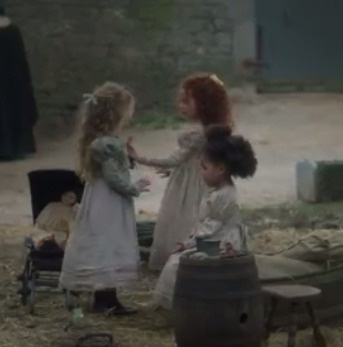
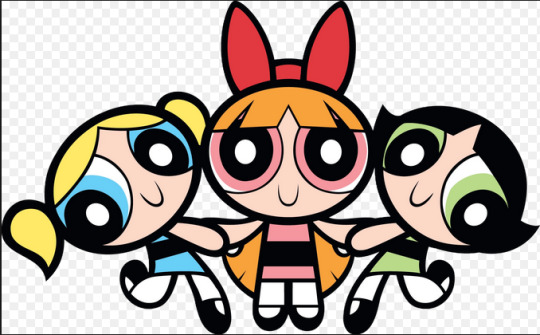
-This is sad as well, because this the last time Cosette will be happy in a very long time.
- Fantine being optimistic and thinking she’ll see Cosette in 6 months really makes me sad, knowing what will happen in the future.
- Madeleine firing Fantine for lying (when he himself is lying, in a way, by hiding his identity) seems harsh and out-of character. Valjean is supposed to have the most dramatic character changes of all the characters, but it looks like he hasn’t changed at all since Toulon.
- Javert talks to Madeleine in the same condescending way he did when he was 24601. He was being all passive-aggressive and basically accusing him of being a criminal without directly saying it to his face.
- The dude that buys Fantine’s hair and teeth looks hella creepy. Like wtf is that tattoo near his eye?
- Javert was super indifferent to Fantine’s death.
- Javert seems more like lawful evil than lawful neutral in this series.
- Valjean Harry Houdinis himself out of prison and shows up to get Cosette...2 years later?
- Rosalie Thénardier (again, I like that she has a first name) is depicted very well and is not solely a comic relief.
- Creepy hair buying guy returns and sells Chuckie Catherine to Valjean
- Valjean when he sees that Thénardier followed him and Cosette into the woods to bargain for more money:
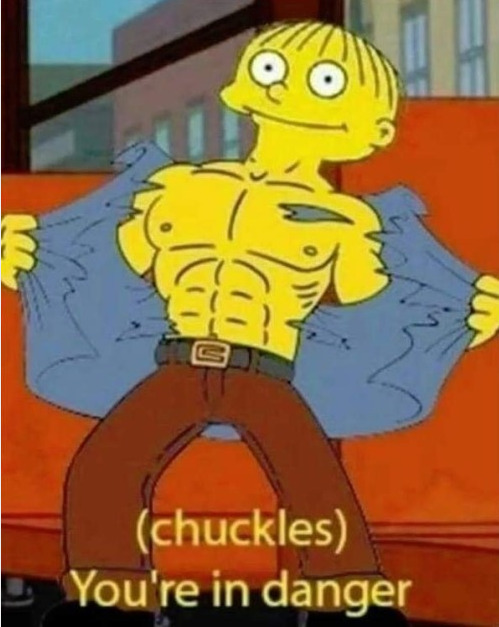
- Cosette is right. The landlord is a nosy lil bitch.
- At the end of episode 3, Javert gets super pissed that Valjean has narrowly escaped. This is so sad Alexa play One Way or Another by Blondie.
- Big time jump! What year is it? Now I miss the exact year being shown on the screen.
- Valjean has morphed into Queen Aggravain from Once Upon a Mattress, so I guess Cosette is a much-smarter Prince Dauntless? (Stop it annachronistic! This is not a musical review. Andrew Davies forbids it 😠)
- Since Cosette has some traits of an ingenue, and since Davies likes making female characters one-dimensional, I was afraid that he was gonna make her really dumb. Thankfully she is smart, and I don’t think that Valjean perceives her as being dumb. I think he is trying to shelter her from the world not because he thinks she is weak, but because he is super paranoid and has trust issues. Like he might be afraid of her meeting someone like Tholomyes or Thénardier.
- But Valjean goes about his protection of Cosette in the most jerkish way possible.
- Mabeuf is the real MVP
- The return of the landlord in episode 4 (dun dun dunn)
- I hate the strip tease scene. Like stahp.
- And I also dislike the over-sexualization of (abused!) women, and the idea that a woman has to be “sexy” or beautiful in order to be loved. In the words of the great Bart Baker “It sends the message to young girls: pretty equals happiness. If you’re ugly then you’re worthless and your life will be bland and shitty”
youtube
- In episode 4 Marius is pretty much a socially awkward Glenn Quagmire from Family Guy.
- The scene where Thénardier forces Azlema to break the window with her hand makes Thénardier look like a sociopath.
- I don’t know why Valjean took Cosette to the Gorbeau house where the Thénardiers were staying. I think it’s to emphasize that Cosette remembers the Thénardiers?
- New drinking game: take a shot every time Thénardier says he was in Waterloo.
- The Gorbeau house raid was actually my favorite scene of episode 4 (I’m biased because I’m an action movie fan), although there is a shocking lack of “would you like my hat?”.
- Valjean going crazy and burning his arm with the hot iron and Madame Thénardier throwing that giant ass rock! I think X Gon’ Give It To Ya by DMX would be the perfect soundtrack for the Gorbeau house scene.
- Gavroche’s brothers/gamin buddies in episode 5!
- Also, Gavroche looks like Huey Freeman from The Boondocks. I cannot unsee this.
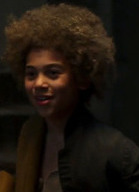
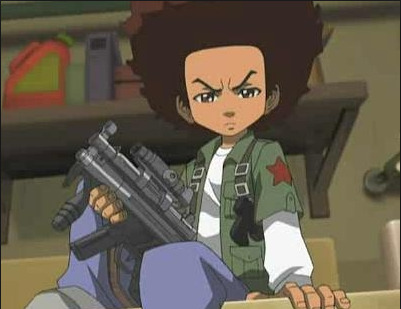
- Marius, justifiably upset at his grandfather says “You disrespected my father, and now you disrespect wife?!” Like, he didn’t even say “future” wife, and he’s only spoken to her 4 times in the show. Slow down there, buckaroo.
- Also Gillenormand changes somewhat even he changed more than Valjean wtf and has some regrets about not letting Marius see his dad.
- I hate seeing Valjean fighting with Cosette. In fact, the whole thing is pretty farcical. There are a lot of Jerry Springer moments.
- Case in point: Enjolras. The background info for the reasons for the June rebellion was glossed over pretty quickly, so it seems like he’s starting shit just to start shit.
- Javert thinks Valjean is the leader of the rebellion like wtf? At this point, BBC Javert seems more like the Javert from the musical (ya know, going after the same criminal for almost 2 decades instead of randomly meeting him in a series of coincidences).
- I love the drone shots of the barricades
- Marius goes from super giddy to suicide bomber in like one day. I love the recurring theme of characters going berserk.
youtube
- And Enjolras and the rebels thought that was a badass moment for him.
- It’s a 3-way tie between Valjean, Javert, and Marius for being the most extra™ character in the series.
- Cosette saying “I hate you” to Valjean somehow seemed both out-of character and justified.
- Éponine getting shot was too sad.
- Gavroche’s body getting put next to Éponine‘s :(
- The army guy staring at Grantaire and Enjolras after killing them :(
- After Valjean finds him at the barricade and sees he has a knife Javert is like:

- Valjean saying he might “change his mind” about not killing Javert ???
- not enough sewers 0/10
- Gillenormand’s reaction when he thought that Marius was dead made me finally feel sympathy for him
- Javert’s suicide was surreal because he was methodical about it. After crying for a few seconds, he goes back to his stoic self and jumps off the bridge because he actually sees it as a logical solution.
- Valjean casually admitting to Marius that he was thinking about murdering him *eyeroll*
- The biggest what-the-fuck moment (history wise) was when Thénardier said he was going to La Jolla in the New World to trade slaves. If I heard it right, he is talking about La Jolla in California. California did not become a state until 1850. So if this is true, then Cosette is in her mid-30′s, Marius is at least 40, and Thénardier is at least 77. Damn, they aged well!
- Valjean’s hair finally changed color once he slips into depression.
- At least Valjean had a peaceful death, and Cosette was by his side. His relationship with his daughter was resolved and the story was able to (sort of) have a happy ending.
- Speaking of endings, the series ends on a frickin’ cliff hanger with the two gamin boys begging on the streets. I guess it’s to show that the world is still a cruel place, but some can overcome it?
- We now need Les Misérables 2: Thénardier goes to America and his 2 unnamed sons get adopted by the Pontmercys.
#les miserables#les miserables bbc#long post#jean valjean#fantine#cosette#marius#eponine#enjolras#grantaire#gavroche#courfeyrac#les amis#javert#the thenardiers#azelma#mabeuf#references to other shows#like a lot#family guy#once upon a mattress#the boondocks#drawn together
10 notes
·
View notes
Text
Brickclub 2.5.1
Hugo breaks the fourth wall to comment on how Paris has changed during his years of exile (and how much he loves the city). I think placing the remarks here also help with the pacing a bit--a it makes short pause to build tension as the chase starts/as it is revealled that JVJ isn't being paranoid and the police are actually following him.
Javert started at the Gorbeau House, as did JVJ & Cosette. So, did he stop to pick up reinforcements along the way, or were the extra three guys also hanging around the Gorbeau House? That is, JVJ leave just before a planned raid, or did his departure confirm Javert's suspicions?
3 notes
·
View notes
Text

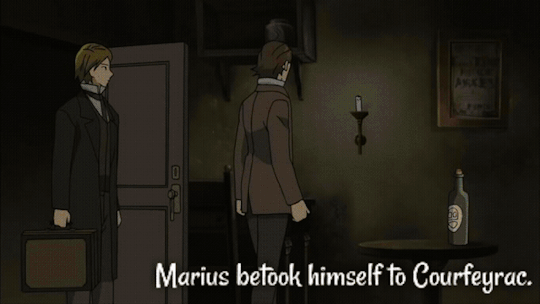
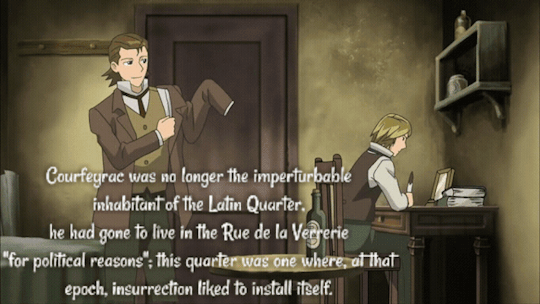

A friend in need, friend indeed. Volume 4, Book 2, Chapter 1.
Clips from <Il cuore di Cosette>.
#Les miserables#les mis#My Post#Marius#Courfeyrac#The Center and the Bonapartist#Gorbeau Raid#I have come to sleep with you.#The Brick#Il cuore di Cosette#Les Mis Letters
19 notes
·
View notes
Text
One more mention of cholera! I really miss the cholera digression in the Brick. Was it so hard to write one more digression? Marius and Cosette did not notice it, so we also should not notice it. Though it was such a big thing and claimed around 19,000 lives in six months. How preoccupied one should be not to notice it! And Hugo was obviously not interested. None of those several dozen inhabitants of Paris who operate in Les Mis died of it (Lamarque doesn’t count, he is not a character here) – it’s a miracle! I really want to know how Jean Valjean reacted to the news about the cholera epidemic. Did he stay home more than usually? Did he not worry about it at all? (In the next chapter, we'll find out that it did not affect his habit of going out to walk in the evening.)
Cosette and Marius continue learning new things about each other, and they find further similarities and differences in their life stories. Marius is trying to brag about his baron title, and Cosette reaction is just adorable: “this had produced no effect on Cosette. She did not know the meaning of the word. Marius was Marius.”
This chapter is not as easy-going as the previous one. “Loving almost takes the place of thinking,” alerts Hugo. It’s about Marius, who tries to brush aside memories about the Gorbeau house adventure, though he subconsciously understands that this is important, and they should have discussed it with Cosette. Instead, he suppresses this memory, preferring to remain in “a rosy cloud.” This will hit them quite painfully.
Cholera-related cartoon from 1832:
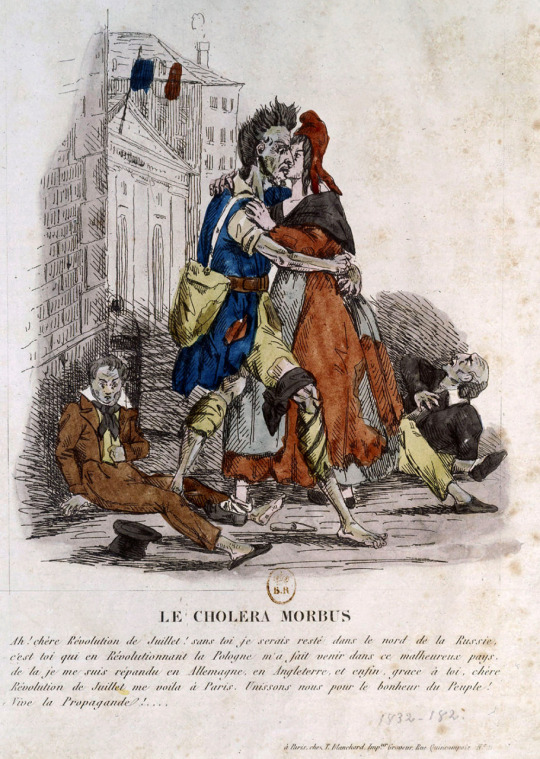
#les mis letters#lm 4.8.2#les miserables#cosette#marius pontmercy#jean valjean#cholera#gorbeau house raid
46 notes
·
View notes
Text
Les Mis in Real Time: The Impossible Readalong 2
When Last We Left This Absurd Idea, it was 1828! and the Readalong would have been running thirteen years.
Happily we are not entering somewhat chronological and evenly-spaced events for a while!
The chapters about Marius and the Amis are spaced out over the next two years. The Gamin Digression marks 1829, with Gavroche dropping by the Gorbeay house and Marius living there. Along with all this we get a few chapters about Cosette and Valjean leaving the convent and setting up their new home, and Cosette growing up. After a couple years of this, Marius and Cosette finally meet (in Spring, 1830-3.6.1) !
The Entire Damn Next Year, starting in the summer: Marius and Cosette flirt, Valjean angsts, Marius gets his stalker on, Valjean and Cosette move, Valjean and Cosette encounter the Chain Gang, Marius enters his Depression Year. A Year of Suffering for everyone, especially everyone who’s not super Into this part of the story; it’s all that’s happening for several months. At least the Patron Minette can get introduced?
THEN IT’S FEBRUARY FINALLY
TIME FOR GORBEAU ADVENTURES
Feb 3: the ENTIRE Gorbeau Raid, from Marius meeting Eponine to Marius leaving the house and moving in with Courfeyrac, hits!
ok taking a break here bc after this I gotta start parsing chapters kinda intensely again because dates starting getting very specific!
Also : it has, hypothetically, been SEVENTEEN. YEARS.
55 notes
·
View notes
Text
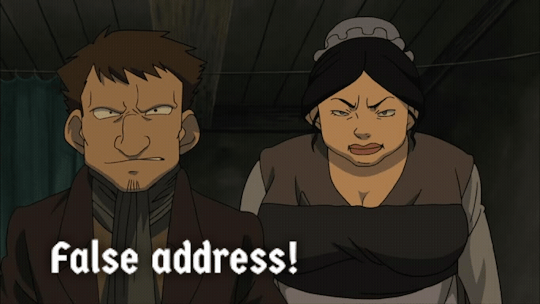


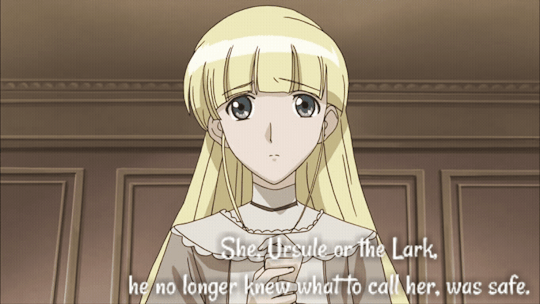

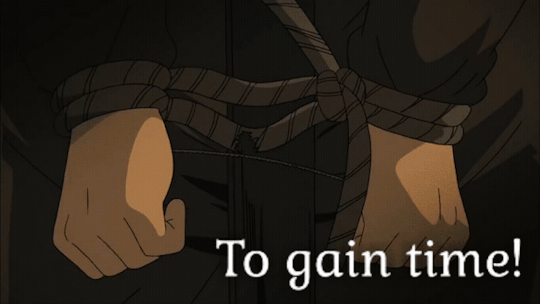
M. Leblanc's usage of fake address, Volume 3, Book 8, Chapter 20.
Clips from <Il cuore di Cosette>.
#Les miserables#les mis#My Post#Mme. Thenardier#Patron-Minette#Babet#Marius#Cosette#The Lark#Mlle. Ursule#Thenardier#Jean Valjean#M. Leblanc#Gorbeau Raid#He's not just a strong man.#He's smart too.#The Brick#Il cuore di Cosette#Les Mis Letters
17 notes
·
View notes
Text

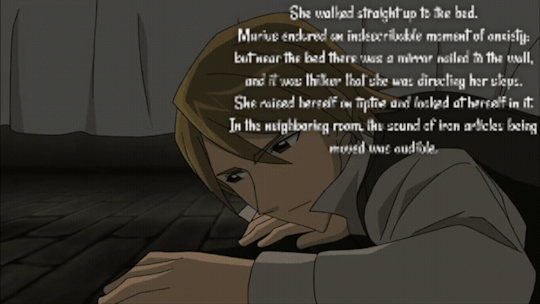
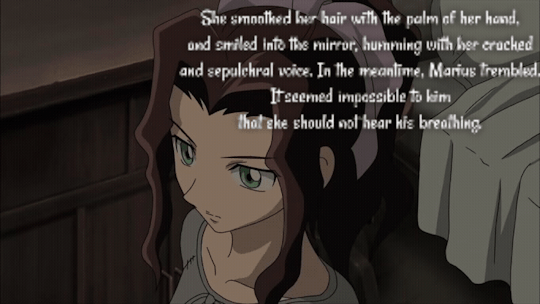

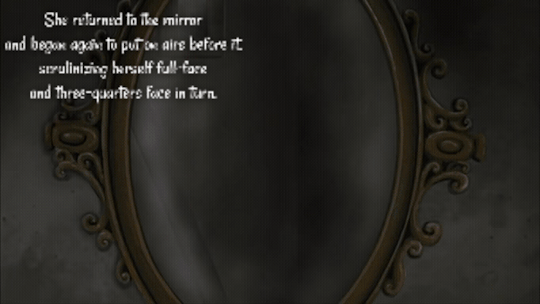


Eponine spying on Marius' room before the Raid in 3.8.16.
Clips from <Il cuore di Cosette>.
#Les miserables#les mis#My Post#Eponine#Rose in Misery#Marius#Love Triangle#Thenardier#Jondrette#Azelma#Thenardier Sisters#Gorbeau Raid#The Brick#Il cuore di Cosette#Les Mis Letters
12 notes
·
View notes